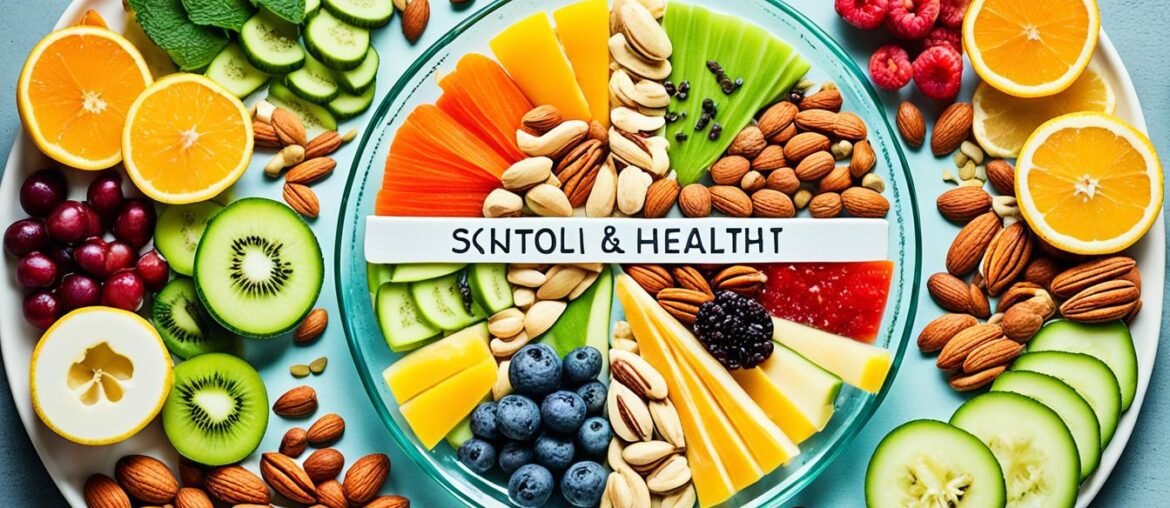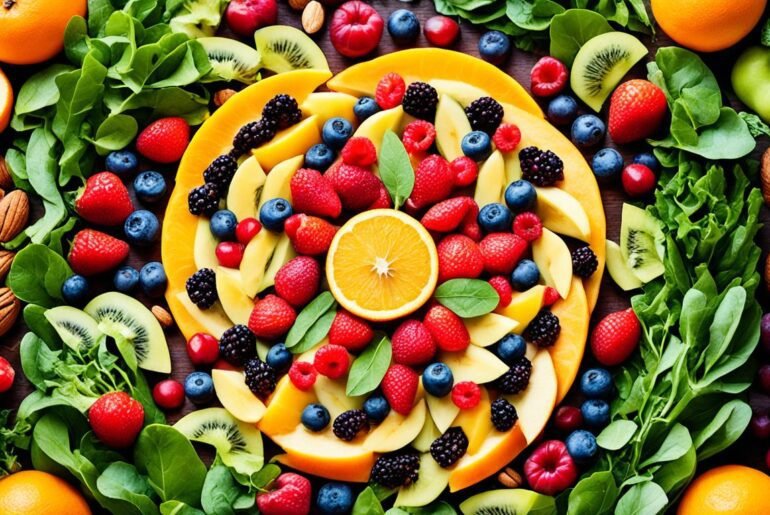Did you know that the foods you eat can have a significant impact on the health and appearance of your skin as you age? It’s true! By nourishing your body with the right nutrients, you can maintain youthful skin and promote healthy aging. A skin-friendly diet is not about magic potions or quick fixes, but rather a long-term commitment to providing your body with the essential building blocks it needs for optimal skin health.
Key Takeaways:
- Choosing a diet rich in nutrient-dense foods can support healthy aging and help you look and feel your best.
- Foods like extra virgin olive oil, green tea, fatty fish, dark chocolate, vegetables, flax seeds, pomegranates, bell peppers, watermelon, and cod are all skin-friendly and can promote youthful skin.
- These foods are packed with antioxidants, healthy fats, and other skin-friendly nutrients that protect against damage, reduce inflammation, and support collagen production.
- Remember to consult with a healthcare professional or registered dietitian before making any major dietary changes to ensure they align with your specific needs and health goals.
Extra Virgin Olive Oil
Extra virgin olive oil is a versatile and healthy addition to any diet. It is rich in monounsaturated fats, antioxidants, and has anti-inflammatory properties that benefit both your overall health and your skin. The monounsaturated fats in extra virgin olive oil help reduce inflammation and oxidative damage caused by free radicals, which are major contributors to skin aging.
Research has shown that consuming extra virgin olive oil as part of a balanced diet can lower the risk of chronic diseases, such as heart disease and type 2 diabetes. The antioxidants present in olive oil, including tocopherols and beta carotene, help protect against severe skin aging by combating the effects of free radicals.
Incorporating extra virgin olive oil into your meals can be as simple as using it as a salad dressing, drizzling it over roasted vegetables, or using it for cooking. Choosing cold-pressed extra virgin olive oil ensures that you maximize its health benefits, as this type of oil retains more of its natural antioxidants and nutrients.
Benefits of Extra Virgin Olive Oil:
- Rich in monounsaturated fats that reduce inflammation
- Packed with antioxidants that combat free radicals
- May help lower the risk of chronic diseases
- Protects against severe skin aging
Choosing cold-pressed extra virgin olive oil ensures that you maximize its health benefits.
By incorporating extra virgin olive oil into your diet, you can enjoy its many benefits while promoting healthier skin and reducing the risk of chronic diseases.
Green Tea

Green tea is a popular beverage known for its health benefits and rich antioxidant content. It is packed with polyphenols, specifically epigallocatechin gallate (EGCG), catechins, and gallic acid, which contribute to its powerful antioxidant properties.
Antioxidants are important for our overall health as they help fight free radicals, which are unstable molecules that can cause damage to cells and contribute to chronic diseases. Green tea’s high concentration of antioxidants makes it a key player in reducing the risk of heart disease, neurological decline, and premature aging.
In addition to its systemic benefits, green tea has been studied for its potential to reduce external skin aging. Environmental stressors such as UV light and pollution can accelerate the aging process, leading to wrinkles, fine lines, and dull skin. The polyphenols in green tea have been found to scavenge free radicals and protect the skin against these external stressors, helping to maintain a youthful complexion.
Although green tea shows promising results in reducing skin aging, it is essential to note that more research is needed to firmly establish its effectiveness. However, incorporating green tea into your diet can provide a range of health benefits, including reducing chronic diseases and protecting against external skin aging.
Fatty Fish
Fatty fish like salmon are highly nutritious and promote healthy skin. They are rich in omega-3 fats, which have been linked to benefits against heart disease, inflammation, and skin health.
Omega-3 fatty acids play a vital role in maintaining a healthy skin barrier, preventing moisture loss and keeping skin supple and hydrated. They also help decrease inflammation that can damage the skin and contribute to the development of various skin conditions.
Fatty fish are also beneficial for collagen production and elastin production, essential proteins that give the skin its structure and elasticity. Omega-3 fats support the synthesis of collagen and elastin, promoting a more youthful and resilient skin appearance.
In addition, fatty fish contain astaxanthin, a potent carotenoid antioxidant that helps improve skin elasticity and hydration. Astaxanthin has been shown to reduce the appearance of wrinkles and fine lines, making the skin look smoother and more youthful.
Furthermore, fish high in selenium, such as cod, can provide additional benefits for skin health. Selenium is an essential mineral that acts as an antioxidant, protecting the skin against free radical damage. It may also help reduce and prevent skin damage from UV light and improve skin conditions like psoriasis.
Enjoying fatty fish as part of a balanced diet can provide numerous benefits for not only your skin but also your overall health and well-being.
| Fatty Fish | Omega-3 Fats | Heart Disease | Inflammation | Skin Barrier | Collagen Production | Elastin Production | Wound Healing | Selenium |
|---|---|---|---|---|---|---|---|---|
| Salmon | ✓ | ✓ | ✓ | ✓ | ✓ | ✓ | ✓ | |
| Tuna | ✓ | ✓ | ✓ | ✓ | ✓ | ✓ | ✓ | |
| Mackerel | ✓ | ✓ | ✓ | ✓ | ✓ | ✓ | ✓ | |
| Sardines | ✓ | ✓ | ✓ | ✓ | ✓ | ✓ | ✓ | |
| Cod | ✓ | ✓ | ✓ | ✓ | ✓ | ✓ | ✓ |
Dark Chocolate or Cocoa

Dark chocolate is rich in polyphenols, particularly flavanols, which act as antioxidants in the body. Consuming dark chocolate may have numerous health benefits, such as a lower risk of heart disease, type 2 diabetes, and cognitive decline. Some research suggests that the flavanols in dark chocolate can help protect the skin from sun damage, slow down skin aging, improve skin elasticity, and reduce facial wrinkles.
It is recommended to choose dark chocolate with a high cocoa content and minimal added sugar for maximum benefits.
The Benefits of Dark Chocolate or Cocoa for Skin Health
Dark chocolate or cocoa contains a significant amount of polyphenols, flavanols, and antioxidants, which contribute to its positive impact on skin health. These compounds have been shown to improve skin elasticity, reduce wrinkles, and provide protection against skin damage caused by free radicals.
The flavanols in dark chocolate have the potential to slow down skin aging and protect the skin from sun damage.
While the exact mechanisms behind these effects are still being researched, dark chocolate is believed to promote better blood circulation, enhance skin hydration, and boost collagen production. These factors collectively contribute to healthier and more youthful-looking skin.
The Role of Polyphenols and Antioxidants in Skin Health
Polyphenols and antioxidants found in dark chocolate have powerful anti-inflammatory properties that can help reduce skin redness and inflammation, as well as protect against harmful environmental stressors. They work by neutralizing free radicals, which are unstable molecules that can cause damage to the skin cells and accelerate the aging process.
Additionally, the flavanols in dark chocolate have been shown to improve blood flow to the skin, resulting in better delivery of nutrients and oxygen to the skin cells. This enhanced circulation can promote a more vibrant and youthful complexion.
Choosing the Right Dark Chocolate
When selecting dark chocolate for its skin benefits, it is important to choose products with a high cocoa content, preferably above 70%. This ensures a higher concentration of flavanols and antioxidants. Avoid dark chocolate that is heavily processed or contains excessive amounts of added sugar, as these can diminish its potential health benefits.
Remember, while dark chocolate can provide some positive effects on skin health, it should still be consumed in moderation as part of a balanced diet. Incorporating dark chocolate into a well-rounded skincare routine, alongside a healthy lifestyle, can help you reap the most benefits for your skin.
Vegetables
When it comes to maintaining healthy and youthful skin, incorporating a variety of vegetables into your diet is crucial. Vegetables are not only nutrient-dense but also low in calories, making them an excellent choice for overall health and skin health.
One of the key benefits of vegetables is their high antioxidant content. Antioxidants play a vital role in reducing the risk of heart disease, cataracts, and certain cancers, while also protecting the skin from damage caused by free radicals.
Vegetables are also rich in carotenoids, such as beta carotene and lycopene. These compounds give vegetables their vibrant colors and have been found to protect the skin against harmful UV rays and prevent premature skin aging.
In particular, vegetables rich in vitamin C are essential for maintaining healthy skin. Vitamin C supports collagen production, which helps keep the skin firm and elastic. Some examples of vitamin C-rich vegetables include leafy greens, bell peppers, tomatoes, and broccoli. Including these vegetables in your diet can promote youthful-looking skin and support its overall health.
Remember, it’s important to eat vegetables of different colors to benefit from a variety of antioxidants. Each color represents unique types of antioxidants, so aim for a rainbow of vegetables on your plate.
Here’s a list of colorful vegetables and their associated antioxidants:
| Color | Vegetable | Antioxidants |
|---|---|---|
| Red | Tomatoes | Lycopene |
| Orange | Carrots | Beta carotene |
| Yellow | Yellow bell peppers | Vitamin C |
| Green | Spinach | Lutein |
| Purple | Eggplant | Anthocyanins |
By incorporating a colorful array of vegetables into your diet, you can ensure you’re getting a wide range of antioxidants and other beneficial nutrients that support healthy and youthful-looking skin.
Flax Seeds
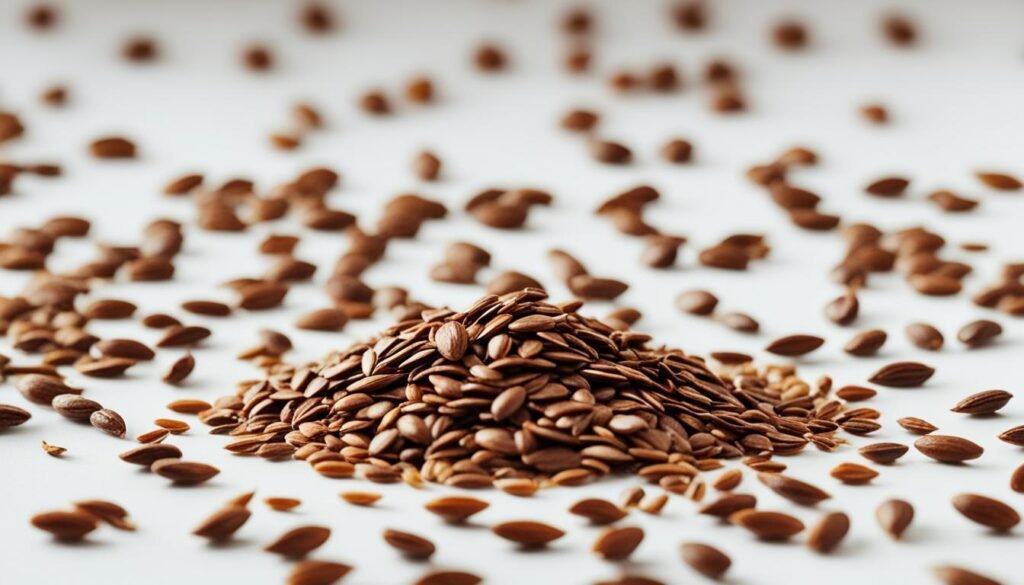
Flax seeds are a great addition to any diet, offering numerous health benefits. These tiny seeds are packed with essential nutrients that can promote overall well-being, including healthy skin.
One of the key components of flax seeds is lignans, which are powerful antioxidants that help fight free radicals in the body. Free radicals are unstable molecules that can cause oxidative stress and damage cells, leading to aging and chronic diseases. By including flax seeds in your diet, you can help lower the risk of heart disease, breast cancer, and other conditions associated with free radical damage.
Additionally, flax seeds are an excellent source of omega-3 fatty acids, particularly alpha-linolenic acid (ALA). Omega-3 fatty acids are vital for maintaining a healthy skin membrane. They promote hydration, elasticity, and plumpness, contributing to a youthful appearance.
The antioxidants found in flax seeds also provide additional benefits for skin health. By neutralizing free radicals, these antioxidants help protect the skin from damage and maintain its overall health. Including flax seeds in your diet can contribute to healthier skin and help combat the signs of aging.
How to Incorporate Flax Seeds Into Your Diet
There are various ways to enjoy flax seeds as part of a balanced diet. Here are a few ideas:
- Sprinkle ground flax seeds on top of oatmeal or cereal.
- Add flax seeds to smoothies or yogurt for an extra nutrient boost.
- Mix flax seeds into baked goods like muffins or bread.
- Use flaxseed oil as a dressing for salads or as a replacement for other cooking oils.
- Include flax seed flour in your favorite recipes as a substitute for traditional flour.
Remember to consume ground flax seeds or flaxseed oil, as the whole seeds may pass through the digestive system undigested and limit nutrient absorption.
Overall, incorporating flax seeds into your diet is a simple and effective way to improve your skin’s health and fight the signs of aging. By harnessing the power of lignans, omega-3 fatty acids, and antioxidants, flax seeds contribute to a healthy, youthful complexion.
| Nutrient | Amount per 1 tablespoon (10g) |
|---|---|
| Calories | 55 |
| Protein | 2g |
| Fat | 4g |
| Carbohydrates | 3g |
| Fiber | 2g |
| Omega-3 Fatty Acids (ALA) | 1.6g |
| Lignans | 85.5mg |
Pomegranates
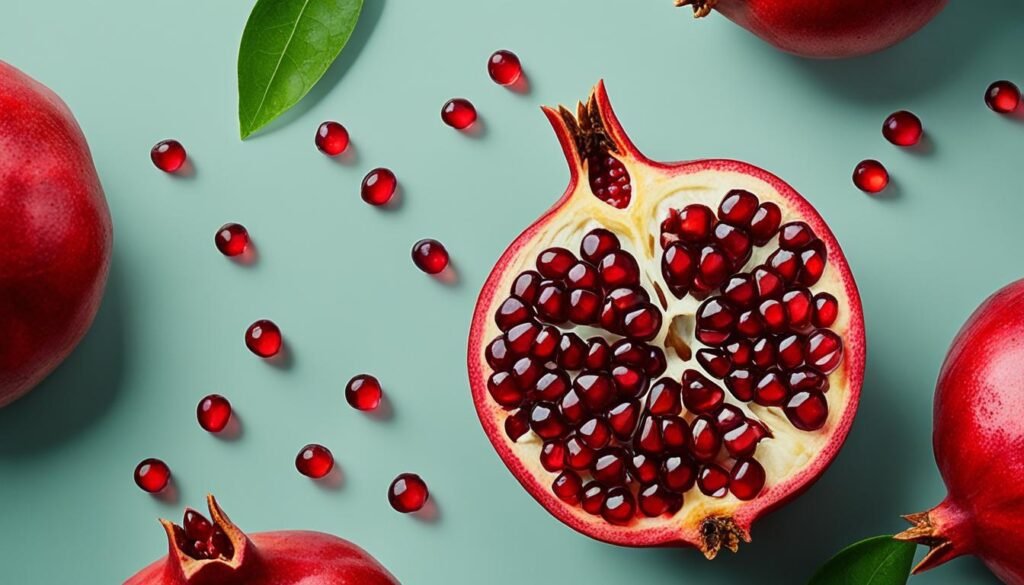
Incorporating pomegranates into your diet can provide numerous benefits for your skin. Pomegranates are packed with antioxidants, including flavonols, tannins, phenolic acids, and lignans, which play a crucial role in skin repair and protection.
The antioxidants found in pomegranates help to repair and protect the skin from sun-related damage. They work by neutralizing free radicals, which are unstable molecules that can cause oxidative stress and lead to skin aging. By reducing oxidative stress, pomegranates promote the production of new collagen, a protein that gives the skin its structure and elasticity.
Research suggests that pomegranate antioxidants may also reduce the damage caused by UV rays, preventing the severity of skin aging. The high antioxidant content in pomegranates makes them an excellent choice for skin repair and protection against sun-related damage.
| Pomegranates | Benefits |
|---|---|
| Antioxidants | Repair and protect the skin |
| Flavonols | Promote collagen production |
| Phenolic acids | Reduce UV skin damage |
| Lignans | Decrease the severity of skin aging |
Further Benefits of Pomegranates
Pomegranates not only provide benefits for the skin but also offer other health advantages. They are rich in essential nutrients, such as vitamin C and potassium, which support overall well-being.
Additionally, pomegranates have anti-inflammatory properties, which can help reduce inflammation in the body and potentially benefit skin conditions like acne or rosacea.
Consider adding pomegranates to your diet to take advantage of their antioxidant-rich properties and promote skin repair and protection. Whether consuming the fruit itself, drinking pomegranate juice, or incorporating pomegranate seeds into your meals, you can enjoy the benefits of this delicious and skin-friendly fruit.
Bell Peppers
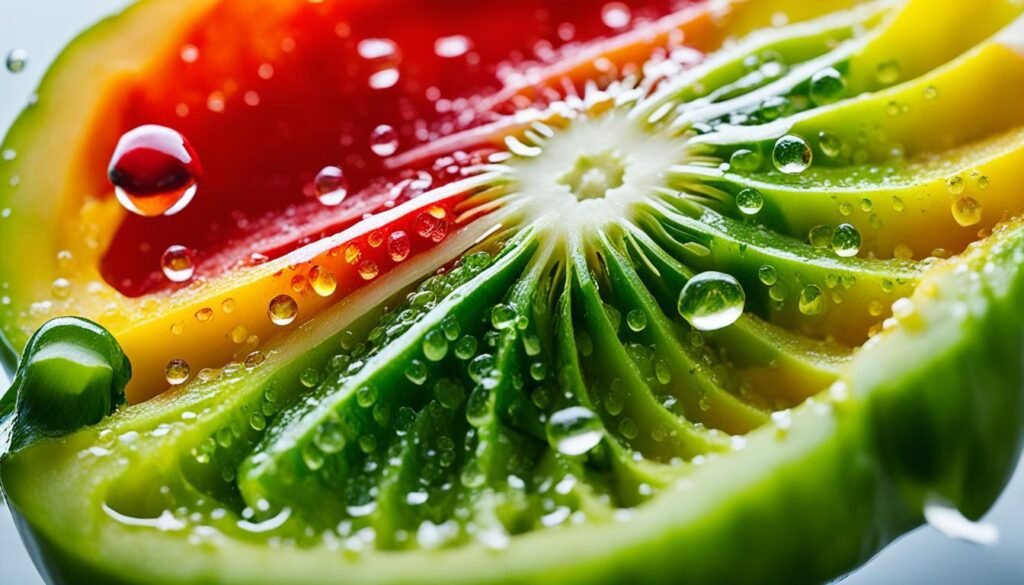
Bell peppers are a fantastic addition to any diet, especially for promoting skin health. These vibrant vegetables are packed with the essential nutrient vitamin C, which boasts powerful antioxidant properties and plays a crucial role in collagen synthesis.
Vitamin C, as an antioxidant, helps protect the skin from harmful free radicals and prevent the oxidative damage caused by UV light. This vitamin also aids in wound healing and helps maintain the health and integrity of the skin.
Consuming bell peppers regularly can support skin health, keeping it nourished and vibrant. Whether enjoyed raw in salads or cooked in various dishes, bell peppers are a versatile and delicious way to incorporate vitamin C into your diet.
The Benefits of Bell Peppers for Skin Health:
| Benefits | Description |
|---|---|
| Antioxidant Properties | Vitamin C in bell peppers acts as an antioxidant, protecting the skin from free radicals and oxidative stress. |
| Promotes Collagen Synthesis | Vitamin C plays a vital role in collagen synthesis, the protein responsible for maintaining the skin’s structure and elasticity. |
| Supports Skin Health | Regular consumption of bell peppers can help maintain the health and integrity of the skin. |
Watermelon
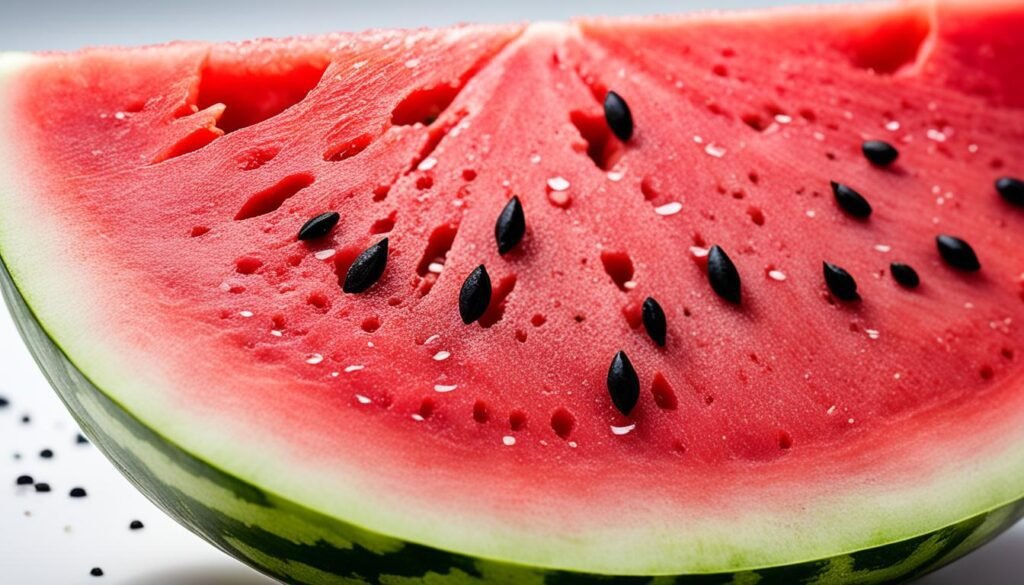
Watermelon is a hydrating fruit with a high water content that helps maintain skin elasticity and hydration. It’s not just a refreshing summer snack; it also provides important nutrients for skin health.
One of the key components of watermelon is beta-carotene, a precursor to vitamin A. Beta-carotene acts as an antioxidant, protecting the skin from oxidative stress and damage caused by free radicals. This can help maintain a youthful appearance and reduce the signs of aging.
Watermelon is also rich in vitamin C, another powerful antioxidant. Vitamin C plays a crucial role in collagen production, which is essential for healthy skin. Collagen helps maintain the skin’s structure and elasticity, keeping it firm and supple. Additionally, vitamin C has been shown to have anti-inflammatory properties, which can help soothe inflammation and redness in the skin.
| Nutrient | Amount per 100g |
|---|---|
| Water | 92% |
| Carbohydrates | 8g |
| Beta-carotene | 467µg |
| Vitamin C | 8.1mg |
Watermelon is not only hydrating but also low in calories, making it a guilt-free addition to your diet. You can enjoy it as a refreshing snack on its own, or incorporate it into salads, smoothies, or even grilled dishes for a burst of summer flavor.
Benefits of Watermelon:
- Hydrates the skin due to its high water content
- Provides antioxidants like beta-carotene and vitamin C
- Supports collagen production for youthful and firm skin
- Has anti-inflammatory properties that can help soothe skin irritations
“Watermelon is not only delicious, but it’s also a great source of hydration and skin-loving nutrients. Incorporating watermelon into your diet can help keep your skin looking and feeling its best.” – Dr. Sarah Johnson, Dermatologist
Cod
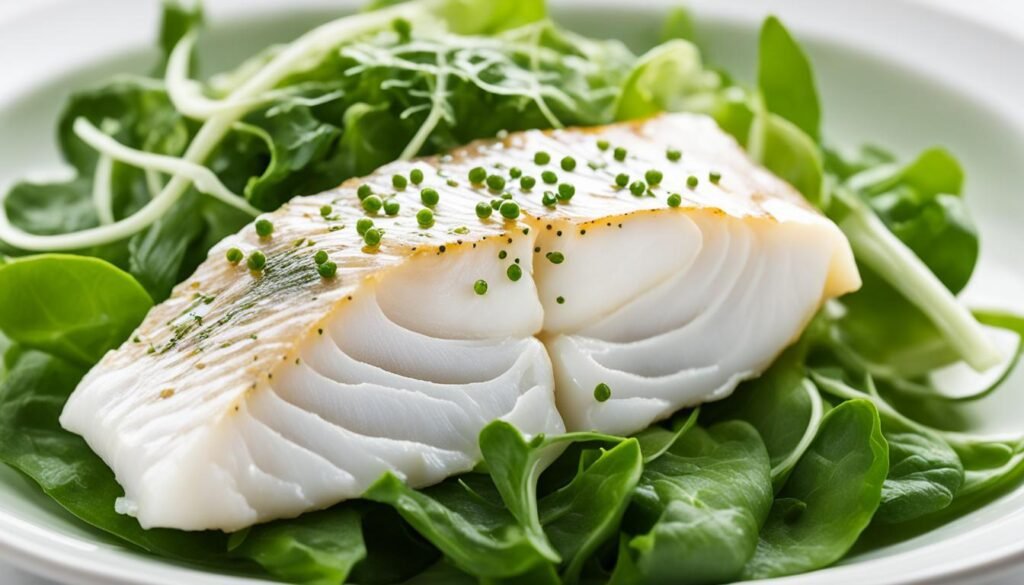
Cod is a type of fish that is rich in essential fatty acids, including omega-3s. These nutrients play a crucial role in maintaining optimal skin function and appearance.
Omega-3 fatty acids are known for their ability to improve skin health by promoting a strong skin barrier and reducing inflammation. These essential fats can help keep the skin moisturized, reduce redness and irritation, and support overall skin health.
Consuming cod and other fatty fish regularly can provide numerous benefits for both skin health and heart health. Omega-3 fatty acids are considered heart-healthy fats and have been shown to lower the risk of cardiovascular diseases, such as heart attacks and strokes.
Incorporating cod into your diet can be a delicious and nutritious way to support both your skin and your cardiovascular system.
Nutritional Value of Cod
| Nutrient | Amount per 100g |
|---|---|
| Protein | 18g |
| Omega-3 Fatty Acids | 0.2g |
| Vitamin B12 | 1.5μg |
| Vitamin D | 4.8μg |
| Phosphorus | 250mg |
| Potassium | 448mg |
Table: Nutritional value of cod per 100g. Source: National Nutrient Database for Standard Reference Legacy Release.
Conclusion
In conclusion, maintaining a healthy diet that includes skin-friendly foods is essential for supporting healthy aging and nourishing both your body and mind. By incorporating a variety of nutrient-rich and antioxidant-packed foods into your daily meals, you can promote skin health and protect against premature aging.
Foods such as extra virgin olive oil, green tea, fatty fish, dark chocolate, vegetables, flax seeds, pomegranates, bell peppers, watermelon, and cod provide a wide range of vitamins, minerals, and antioxidants that help nourish your skin from within. These foods support collagen production, reduce inflammation, protect against environmental stressors, and improve overall skin health.
As you embark on your journey to maintain youthful skin and achieve healthy aging, it is important to consult with a healthcare professional or registered dietitian. They can provide personalized guidance and recommendations based on your specific needs and goals. Remember, healthy skin begins with a healthy diet!
FAQ
What is the role of diet in maintaining skin youthfulness?
Diet plays a crucial role in maintaining skin youthfulness by providing the necessary nutrients and antioxidants to promote healthy skin and protect against aging.
What are some anti-aging foods to include in a skin-friendly diet?
Some anti-aging foods to include in a skin-friendly diet are extra virgin olive oil, green tea, fatty fish, dark chocolate, vegetables, flax seeds, pomegranates, bell peppers, watermelon, and cod.
How does extra virgin olive oil benefit skin health?
Extra virgin olive oil is rich in healthy fats and antioxidants that reduce inflammation and oxidative damage. It may help reduce skin aging, lower the risk of chronic diseases, and protect against severe skin aging.
What are the benefits of green tea for the skin?
Green tea is high in antioxidants, particularly polyphenols, which can help fight free radicals, reduce the risk of chronic diseases, and potentially protect against external skin aging caused by environmental stressors.
How does fatty fish promote healthy skin?
Fatty fish, such as salmon, are rich in omega-3 fats that support a healthy skin barrier, decrease inflammation, and promote collagen and elastin production. They also contain antioxidants like astaxanthin and selenium, which improve skin elasticity, hydration, and protect against skin damage.
How can dark chocolate or cocoa benefit the skin?
Dark chocolate or cocoa, rich in polyphenols like flavanols, act as antioxidants and may help protect the skin from sun damage, slow down skin aging, improve skin elasticity, and reduce facial wrinkles when consumed in moderation.
What role do vegetables play in maintaining skin health?
Vegetables are nutrient-dense and rich in antioxidants, carotenoids, and vitamin C that help reduce the risk of chronic diseases and protect the skin against UV rays. Eating a variety of vegetables of different colors can support overall skin health.
How do flax seeds contribute to healthier skin?
Flax seeds contain lignans and omega-3 fatty acids that fight free radicals, lower the risk of chronic diseases, contribute to a healthy skin membrane, and help keep the skin hydrated and plump.
What benefits do pomegranates offer for the skin?
Pomegranates are rich in antioxidants that repair and protect the skin against sun-related damage, promote the production of collagen, and can reduce the severity of skin aging.
How do bell peppers support skin health?
Bell peppers are a great source of vitamin C, which has antioxidant properties and plays a role in preventing and treating skin damage from UV light, promoting wound healing, and supporting collagen synthesis.
Why is watermelon beneficial for the skin?
Watermelon, with its high water content, provides hydration and contains beta-carotene and vitamin C, which have antioxidant and anti-inflammatory properties that promote skin health.
How can cod contribute to overall skin health?
Cod and other fatty fish are rich in essential fatty acids, including omega-3s, that improve skin health, promote a strong skin barrier, reduce inflammation, and support heart health.

